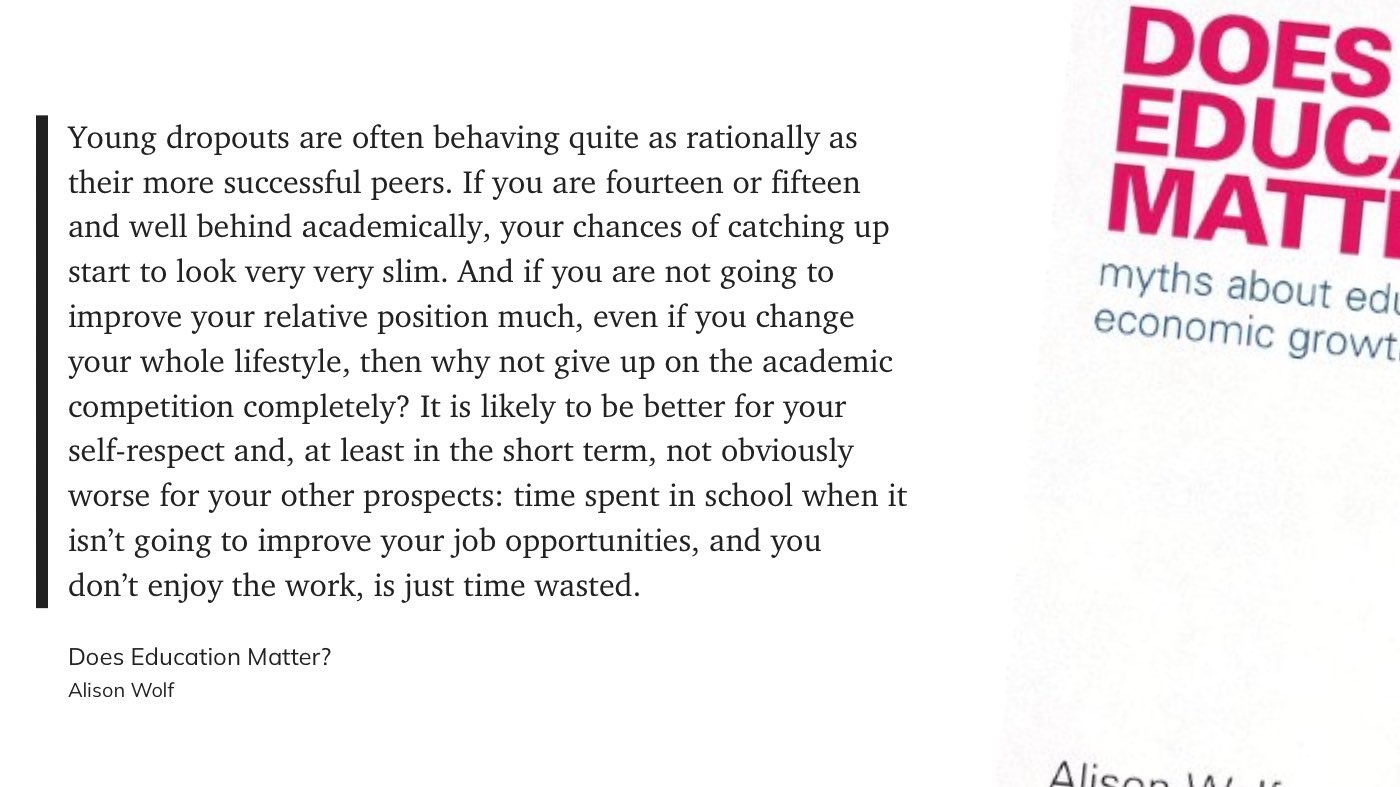The other day @miss_mcinerney posted the following quote:

I’ll come back to this later.
I’m also going to be fashionable and quote Barak Rosenshine:-
“The research also suggests that the optimal success rate for fostering student achievement appears to be about 80 percent. A success rate of 80 percent shows that students are learning the material, and it also shows that the students are challenged.”
Again, I’ll come back to this later.
There are always big arguments about the exam system going on. Are there too many, too few, too early, too late etc, etc, etc. For me, what happens too often is the argument gets taken over by the “exams are the most equitable/least gameable” argument and the underlying issue is passed over. Again, for me, the issue isn’t one of whether or not exams are the fairest method of assessment, it’s that the existence of exams in their current incarnation promotes the failure of too many children.
That’s a bold claim, so I want to paint you picture of why I believe it to be true. Being a mathematician, I’m going to paint the picture using numbers. I’m also going to focus on Maths. Partly because it’s the subject I know, but mainly because it ends up taking up a disproportionate amount of some kids school lives.
In 2019 about 690,000 students sat the Maths GCSE. Of these 59% sat the Foundation tier papers and 41% sat the higher tier1. Before an exam was sat, over 400,000 students were locked out of grades 6, 7, 8 and 9. In reality they were locked out years before.
40.3% of students (278k) achieved a grade 3 or lower2. You can get a 3 on the higher tier (if you are within a few marks of the bottom of the grade 4 boundary), but these figures suggest that the vast majority of those that did were entered for the Foundation tier. This means they achieved lower than 62% on the exam3. Those who got lower than a grade 3 (21.8% or 150,931) scored less than 46%. The figures for grade 2 and grade 1 are 9.2% (64k) lower than 30% and 2.3% (16k) lower than 15% respectively.
Those are the numbers. Let’s focus on the 150,000 who get less than a grade 3.
For the vast majority of these children their result will not have come as a surprise to them Or their parents. Or their teachers. They will have spent at least a year or two trying out exam questions and mostly failing at them. There would have been some areas of success along the way, but their teachers knew they weren’t heading for a grade 5 or even a grade 4. So, for a considerable period of time these children would have been scoring less that 50%, 40%, 30%. I’m unconvinced that Rosenshine would consider it to be appropriate.
Now, these kids may not be mathematicians, but they are not stupid. They know those scores aren’t good. They know (whatever anyone who wants to uphold the letter of the GCSE law says) that a 3 or a 2 or 1 is a failure in that exam.
Yet this is what we prepare them for.
To return to the quote, at this point, what is the rational thing for these self-aware individuals to do?
Accompanying the quote was a kind of question. “I think of this quote about a hundred times a year. And I still can’t work out what I think the solution is.” What can we do different?
I don’t profess to have all the answers. I do know that everyone working their socks off, spending resources, to possibly move a student from a grade 2 to a grade 3 isn’t it. I’m not an expert in HR and labour hiring practices but I doubt that many employers would be thinking “well, I wouldn’t employ them when they had a grade 2 but now it’s a grade 3 the situation is completely different”. I also know that any change requires schools to be at least partially freed from the EBacc/P8 straitjacket. So that’s not going to be popular.
First let’s go back to the National Qualifications Framework (NQF)4. Strictly speaking GCSEs at Grade 3 and below are not a fail. They’re a pass at Level 1. Grade 4 and above is a pass at Level 2. GCEs sit at Level 3 and so on. The problem is that Grade 3 feels like a fail when you open the envelop. If you ask the anecdotal person on the Clapham Omnibus they would say that a Grade 3 is a fail.
I think it is wrong to set students up to be taking an exam where the outcome (and the route along the way) will engender in them a sense of failure. So, the (partial) solution is to move many of these 150,000 students to a different form of certification. We need these students to be sitting qualifications where their path towards them requires success. Where the outcome is a positive certification at Level 1. This is only a problem if we see GCSE as the only possible certification. It’s not. It’s just the simplest. One of the big issues here is if 150,000 students suddenly stopped taking GCSEs then the whole GCSE grading process would fall apart. Which is why DfE don’t encourage change.
What’s better? “This Level 2 certificate has a grade that shows you failed to properly understand 80% of the content studied” or a certificate that says, “This Level 1 certificate has a grade that shows you properly understand at least 80% of the content”? As an employer which gives you more information about the person (and don’t start with the “learning isn’t all about getting a job” – for many of the kids we teach it is).
Ask yourself, which is the best experience for a student – coming into school every day and succeeding, or coming into school every day failing? Ask yourself, how do those 150,931 kids feel each day. Then ask yourself if it’s time for a change.
Footnotes
3 – The grade boundaries used are Edexcels but the other boards are broadly similar. https://qualifications.pearson.com/content/dam/pdf/Support/Grade-boundaries/GCSE/1906-GCSE-9–1-subject-grade-boundaries.pdf
4 – https://www.gov.uk/what-different-qualification-levels-mean/list-of-qualification-levels
